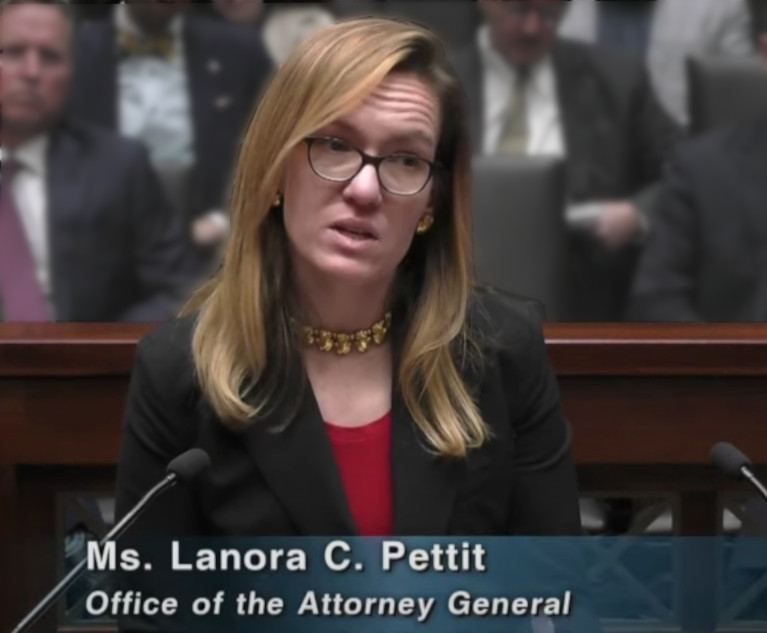Texas Judge Blames Low Blood Sugar for Tirade Against Lawyer, Defendant
"This was wrong, and I am sorry. I have struggled over the past year over why I would act in such a manner, and have come to the conclusion that I was having 'low blood sugar' episode caused by my Type 1 Diabetes," wrote Comal County Court-at-Law No. 1 Judge Randy Gray of New Braunfels.
February 27, 2020 at 02:18 PM
4 minute read
 Photo: Cameron Whitman/Shutterstock.com
Photo: Cameron Whitman/Shutterstock.com
Comal County Court-at-Law No. 1 Judge Randy Gray of New Braunfels received a public warning for an in-chambers tirade against a criminal-defense attorney, who had switched a client's case from the plea docket to the jury docket.
According to the public warning, released by the Texas Commission on Judicial Conduct, attorney Stefanie Collins was representing a man charged with possession of marijuana. The defendant was initially planning to enter a plea agreement, but later changed his mind. His attorney then appeared in Gray's court in March 2018, asking for the defendant's case to be placed on the jury docket.
Collins was told she needed to confer with Gray first. And back in the judge's chambers, Collins perceived that Gray was angry at her client for changing his mind and wanting a jury trial. The warning said that Collins' recalled Gray saying that he would allow the withdrawal of the plea, but that he was going to put the man in jail for "for wasting the court's time."
"Unless he gets a 'not guilty,' he should expect to go to jail for 10 days," the warning recounts about Gray's statement. "If the jury gives him 30 days, I will give him 40. If he pleads, he's going in for at least 10 days as a condition."
'I have struggled over the past year'
Gray, who didn't return a call seeking comment, told his court coordinator to make a note to give the client 10 days in jail. And there is a handwritten note on a case reset form that says just that, the warning said.
When he responded to the complaint before the judicial conduct commission, Gray denied saying he'd give the man 10 days in jail, or telling his court coordinator to write a note. He denied knowing who wrote the note at all, and suggested it was another person.
Yet the coordinator confirmed it was her own handwriting, and she had written the note because the judge told her to do so, the warning said. Later, Gray told the commission that the coordinator's memory had changed. She gave a written statement to the commission saying she had written the note, but she wasn't sure she was supposed to write it, or why she had done it.
Later, though, Gray confessed that he behaved badly towards Collins by threatening to put a defendant in jail for asking for a jury trial, according to the warning.
"This was wrong, and I am sorry. I have struggled over the past year over why I would act in such a manner, and have come to the conclusion that I was having 'low blood sugar' episode caused by my Type 1 Diabetes. This is not an excuse, but rather, an explanation," Gray wrote to the commission, according to the warning.
When he appeared in person before the commission, Gray said his diabetes was inadequately controlled at the time, but since then, he's taken steps to manage his medical condition during times he's performing judicial duties.
The commission determined that Gray had violated judicial ethics rules that required him to comply with the law, maintain professional competence in the law, and perform his duties with no bias or prejudice. It also found he had violated provisions in the Texas Constitution that prohibit him from willful or persistent conduct inconsistent with a judge's duties, which include his lack of cooperation with the judicial conduct commission.
Read the warning:
This content has been archived. It is available through our partners, LexisNexis® and Bloomberg Law.
To view this content, please continue to their sites.
Not a Lexis Subscriber?
Subscribe Now
Not a Bloomberg Law Subscriber?
Subscribe Now
NOT FOR REPRINT
© 2025 ALM Global, LLC, All Rights Reserved. Request academic re-use from www.copyright.com. All other uses, submit a request to [email protected]. For more information visit Asset & Logo Licensing.
You Might Like
View All


Trending Stories
- 1Uber Files RICO Suit Against Plaintiff-Side Firms Alleging Fraudulent Injury Claims
- 2The Law Firm Disrupted: Scrutinizing the Elephant More Than the Mouse
- 3Inherent Diminished Value Damages Unavailable to 3rd-Party Claimants, Court Says
- 4Pa. Defense Firm Sued by Client Over Ex-Eagles Player's $43.5M Med Mal Win
- 5Losses Mount at Morris Manning, but Departing Ex-Chair Stays Bullish About His Old Firm's Future
Who Got The Work
J. Brugh Lower of Gibbons has entered an appearance for industrial equipment supplier Devco Corporation in a pending trademark infringement lawsuit. The suit, accusing the defendant of selling knock-off Graco products, was filed Dec. 18 in New Jersey District Court by Rivkin Radler on behalf of Graco Inc. and Graco Minnesota. The case, assigned to U.S. District Judge Zahid N. Quraishi, is 3:24-cv-11294, Graco Inc. et al v. Devco Corporation.
Who Got The Work
Rebecca Maller-Stein and Kent A. Yalowitz of Arnold & Porter Kaye Scholer have entered their appearances for Hanaco Venture Capital and its executives, Lior Prosor and David Frankel, in a pending securities lawsuit. The action, filed on Dec. 24 in New York Southern District Court by Zell, Aron & Co. on behalf of Goldeneye Advisors, accuses the defendants of negligently and fraudulently managing the plaintiff's $1 million investment. The case, assigned to U.S. District Judge Vernon S. Broderick, is 1:24-cv-09918, Goldeneye Advisors, LLC v. Hanaco Venture Capital, Ltd. et al.
Who Got The Work
Attorneys from A&O Shearman has stepped in as defense counsel for Toronto-Dominion Bank and other defendants in a pending securities class action. The suit, filed Dec. 11 in New York Southern District Court by Bleichmar Fonti & Auld, accuses the defendants of concealing the bank's 'pervasive' deficiencies in regards to its compliance with the Bank Secrecy Act and the quality of its anti-money laundering controls. The case, assigned to U.S. District Judge Arun Subramanian, is 1:24-cv-09445, Gonzalez v. The Toronto-Dominion Bank et al.
Who Got The Work
Crown Castle International, a Pennsylvania company providing shared communications infrastructure, has turned to Luke D. Wolf of Gordon Rees Scully Mansukhani to fend off a pending breach-of-contract lawsuit. The court action, filed Nov. 25 in Michigan Eastern District Court by Hooper Hathaway PC on behalf of The Town Residences LLC, accuses Crown Castle of failing to transfer approximately $30,000 in utility payments from T-Mobile in breach of a roof-top lease and assignment agreement. The case, assigned to U.S. District Judge Susan K. Declercq, is 2:24-cv-13131, The Town Residences LLC v. T-Mobile US, Inc. et al.
Who Got The Work
Wilfred P. Coronato and Daniel M. Schwartz of McCarter & English have stepped in as defense counsel to Electrolux Home Products Inc. in a pending product liability lawsuit. The court action, filed Nov. 26 in New York Eastern District Court by Poulos Lopiccolo PC and Nagel Rice LLP on behalf of David Stern, alleges that the defendant's refrigerators’ drawers and shelving repeatedly break and fall apart within months after purchase. The case, assigned to U.S. District Judge Joan M. Azrack, is 2:24-cv-08204, Stern v. Electrolux Home Products, Inc.
Featured Firms
Law Offices of Gary Martin Hays & Associates, P.C.
(470) 294-1674
Law Offices of Mark E. Salomone
(857) 444-6468
Smith & Hassler
(713) 739-1250







